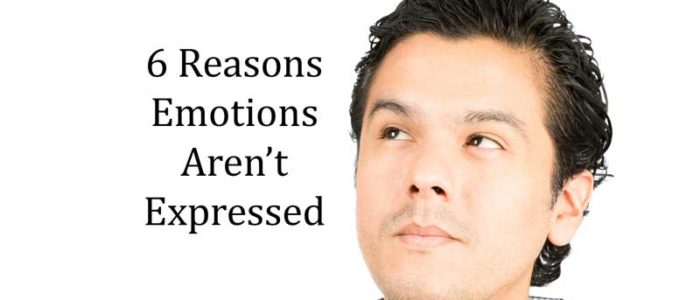6 Reasons Emotions Aren’t Expressed
Not Expressing Emotions Risks Disconnection
I grew up in a family where we didn’t express emotions. I was encouraged to be analytical and logical.
As I’ve mentored couples and talked about my difficulty in recognizing emotions, I’ve learned that there are many people that think the same way. It’s very difficult for many people to recognize and process their emotions. Yet, when we don’t talk about our emotions and our we risk disconnection. Our relationships are not as deep and satisfying as they could be.
As I’ve grown older I’ve learned that expressing emotions is important to my mental health and it’s important to share these emotions with my wife. It’s part of connecting.
I’ve thought long and hard about why I’ve been so uncomfortable with emotions. As I’ve talked to other couples I’ve heard some of their reasons for not talking about emotions.
Here’s 6 Reasons why people don’t express their emotions.
Reason 1: You Shouldn’t Have Negative Emotions
Many people believe that emotions that are considered to be “negative” aren’t acceptable. So, emotions like anger, jealousy, sadness or anxiety are somehow not allowed.
The Bible says, “Rejoice in the Lord always. I will say it again: Rejoice!” (Philippians 4:4) We should be happy all the time. We should be positive. I grew up believing that. If you don’t have anything nice to say to someone, don’t say anything at all.
Somehow, this becomes twisted. We forget that Ecclesiastes also says that there is “a time to weep and a time to laugh.” (Ecclesiastes 3:4)
We forget that other emotions are OK to be expressed.
Reason 2: You Need to Be Rational
I was recently sitting in a small group and this came up. There was more than one person that agreed with this. Some people believe that being rational is the best way to go about life. Emotions just get in the way.
The disadvantage to this way of thinking is that it limits us in being able to connect to others. It also limits us in being able to process our emotions. We risk resentment being built up. When we don’t process our emotions we push them down inside of us. If you do this long enough you either depressed or you have an anger that is boiling beneath the surface.
Part of dealing with emotions is to not be afraid of them. Emotions are part of what make us people.
Reason 3: You Fear Rejection or Disapproval
Rejection or disapproval is a fear that causes many people to hide their feelings. This fear can be very deeply engrained.
“If I tell you what I really feel, you’re not going to approve of me. You’ll reject me.”
It can be caused by a low self-esteem that causes people to believe that they aren’t entitled to express their feelings or needs. It causes them to constantly be concerned with pleasing others.
Then they’re not very assertive. In marriage, when we’re not assertive and not expressing our feelings and needs it causes us to be misunderstood and disconnected. It can keep them locked into a cycle of not getting their needs met.
Reason 4: You Express Yourself Inappropriately
I’ve met some people that haven’t considered how they do express their emotions. They feel that they want to be truthful to how they feel. Any attempt at healthy communication seems insincere.
They blurt out criticism, contempt, name calling and other poor behavior when they feel angry. When that isn’t well received, they either say it louder or hold back their expression of emotions until the next time they explode.
Reason 5: They Should Know How I Feel
Instead of honestly expressing feelings, some people make assumptions about what their spouse should be thinking.
This type of assumption ends up being a trap. It is a type of mind reading that says, “If you really loved me, you would know that I’m hurt.” So, people hold their emotions in and let resentment build up.
The truth is that people don’t know how you feel. Then, you don’t become assertive.
Reason 6: You Don’t Know How
Many people have not grown up with recognizing feelings. This is an honest issue. The good news is that people can learn to recognize emotions.
Tips for Mentors:
- Get a Feelings Chart – It can help to show people a sheet of paper with emotions listed on it. When you’re not comfortable expressing emotions, it helps to have words in front of you.
- Ask People to Express Emotions – We’ll ask people, “How do you feel about that?” For some, this is difficult, but it helps to be asked. We’ll pull out the feelings chart and use that as a tool.
- Help People to Listen for Emotions – We ask people to listen to what feelings they heard from their spouse. Did you hear an emotion under the words? Practice makes perfect. The more that you do this, the better you will become.





Comments are closed.